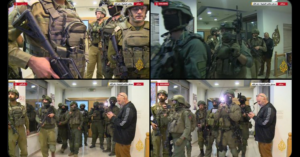The shutdown of Al Jazeera is a dire warning for all journalists in Israel: you’re next

Images of the Israeli military raid on Al Jazeera’s office in Ramallah from Hamdah Salhut on X
Sheren Falah Saab writes in Haaretz on 23 September 2024:
At 4 A.M. on Sunday, Israeli soldiers raided Al Jazeera’s office in Ramallah and delivered an order closing it for 45 days. The incident was mentioned only marginally in the Israeli news on Sunday, yet it ought to trouble every Israeli journalist and every Israeli, period – because what happened in Ramallah might well happen in Neveh Ilan or even Tel Aviv.
The masked soldiers raided the station’s editorial offices and asked its director in Israel, well-regarded veteran journalist Walid al-Omari, to vacate the premises immediately. “There’s a closure order,” one soldier said in a video posted by the channel. For additional information, the soldier said, he should contact the commander of Israeli forces in the West Bank.
The little details that appear in the video are an inseparable part of the big picture. The balance of power between the soldiers and al-Omari is clear and frightening. Upon receiving the closure order, al-Omari understood that it was over, that he had no power to do anything other than film the humiliating situation and then leave.
The soldiers are cogs in the well-greased machinery of this government of destruction, which is gnawing away day by day at freedom of the press and journalistic work. In May, a law was passed that allows the government to end Al Jazeera’s broadcasts in Israel. Of the 120 Knesset members, 71 supported the law.
This law allows the communications minister, with the prime minister’s consent, to order the shutdown of any foreign station’s broadcasts in Israel if the prime minister is convinced that the content causes real harm to national security. It stipulates that any such closure also requires approval by the security cabinet or the full cabinet.
But shutting down Al Jazeera’s offices in Ramallah, which is in Area A of the West Bank – the part fully controlled by the Palestinian Authority under the Oslo Accords – epitomizes the way the government is exploiting the war and leveraging its power to undermine freedom of expression. Even as the northern front was heating up, the government was seizing control of the most important news outlet in the Palestinian arena, one that’s also an important pillar of the Arab world.
After the station’s employees were thrown out, al-Omari insisted on videotaping those final moments. He stood outside the building and filmed his life’s work being destroyed in a moment. “They aren’t even letting us take our cars out of the parking lot, and now they’ve brought a military truck to transport our equipment,” he said in another video. “Meanwhile, the entire area is closed off. The army is inside and has taken over the office.”
Now imagine that the government had decided to close Israel’s Channel 12 or Channel 13 and that police were raiding their offices. Imagine journalist Yonit Levi standing outside the media complex in Neveh Ilan looking sad and shocked. Imagine journalist Dany Cushmaro broadcasting for the last time.
This scenario isn’t disconnected from reality. After all, Communications Minister Shlomo Karhi already has Israel’s public broadcasting corporation in his sights. And the government’s intent to control the media in both the West Bank and Israel has been clear ever since Yulia Shamalov-Berkovich was appointed as CEO of Channel 13, though that appointment was ultimately revoked due to pressure from the channel’s journalists and the Israeli media.
But Palestinian journalists are invisible. Their Israeli colleagues won’t rush to speak up for them on X, and opposition lawmakers won’t voice shock or solidarity with al-Omari and other Palestinian journalists. They don’t understand that what happens in the West Bank can also happen in Israel. A tendency to silence others is a tendency to silence others.
What’s frightening isn’t the closure of the channel per se, but the speed with which such a thing can happen. When al-Omari asked the soldiers how much time his journalists had, they told him “a few minutes.” The army can shut down an important Arab media outlet just because it can.
The silence and normalization in Israel in response to this assault on an Arab media outlet are no less frightening, and they create fertile ground for similar practices inside Israel. Harm to freedom of expression in the Palestinian territories will also seep into Israel. The most salient example of this is the arrest of Israelis demonstrating for a deal to bring the hostages home and to end the war in the Gaza Strip.
The well-publicized arrest of Noa Goldenberg, who was accused of throwing sand at National Security Minister Itamar Ben-Gvir, is one example of the speed with which dangerous processes can take place. And when police are already interfering with journalists who are covering the demonstrations and doing their jobs, al-Omari’s video is just a promo for what might well happen in Israel under the leadership of Karhi and Prime Minister Benjamin Netanyahu.
In another 50 years, lectures at journalism schools and law schools will open with this video. And if it doesn’t happen in Israel, it will elsewhere.
This article is reproduced in its entirety
